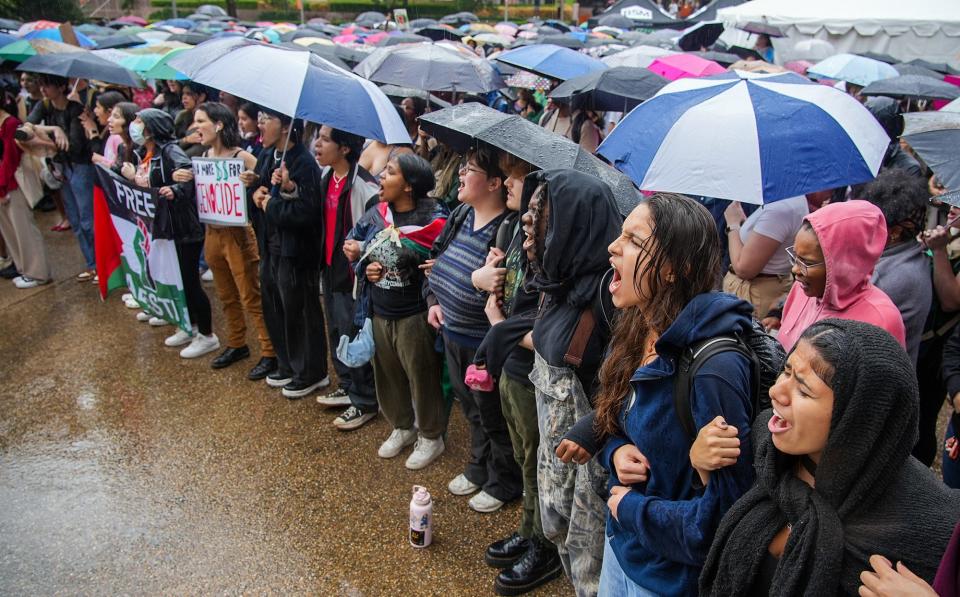Law professor: Even in debate over antisemitism, restricting speech not the best approach
In the ongoing discourse surrounding antisemitism on college campuses, there’s a growing inclination to restrict speech related to Israel and Palestine.
Having spent my recent years as the Supervising Attorney of Duke Law’s First Amendment Clinic documenting incidents of campus censorship, and as a constitutional scholar in this area, these calls for silencing speech are not new to me. Universities regularly take stances on geopolitical events and discipline their community members for micro-aggressions that offend students who belong to other minority groups.

I deeply sympathize with the calls for censorship that members of my Jewish community are making; the apparent difference in concern for their well-being signals that their pain is of lesser importance than the pain of others. That is wrong, and it is unconvincing to suggest that the different treatment stems from elite institution administrators suddenly moving into the pro-free speech camp.
More: Pitts: Free speech case set at U.S. Supreme Court has Hope Mills add-on
Nonetheless, despite the inconsistent standards being applied toward antisemitic speech, censorship of any kind rarely results in positive community growth. The same is true here: restricting campus speech is the wrong approach.
Restricting hate speech does not stop it
The United States has taken a deliberate stance to permit hate speech under the First Amendment, deviating from many other Western countries. Public universities are bound by the First Amendment. Private universities often craft their speech policies (however selectively followed) in accordance with the First Amendment.
While increasing restrictions on offensive speech may seem like a plausible solution for supporting Jewish students, it is essential to question their efficacy in truly combating antisemitism.

Proponents of speech restrictions argue that driving offensive speech underground is a way to mitigate its impact. However, history teaches us otherwise. Germany, Austria, France, Belgium, Poland and Australia all have laws against Holocaust denial and hate speech, yet antisemitism persists.
Suppressing speech does not eradicate the underlying issues. Instead, it fosters an environment where hatred can fester, ultimately resurfacing with greater intensity.
Persistent antisemitism in Europe, despite government speech bans
The same antisemitism that made people smile as my Hassidic Jewish grandfather was kidnapped from his home in now-Poland and carted off to Auschwitz by way of the Biesiadka, Blechhammer, and Pustkow concentration camps still exists today, with people in Poland’s parliament trying to extinguish Hanukkah candles while labeling Jews “satantic.” The hatred of Jews does not disappear when the government outlaws denying or celebrating their genocide.
The absence of antisemitism in these countries is a fallacy; rather, it highlights the limitations of silencing offensive discourse without addressing its root causes. These laws have done nothing to prevent the eruption of “Gas the Jews!” chants outside the Sydney Opera House in October, nothing to stop swastikas from appearing on Jewish graves in France in November, and nothing to stop Belgium soccer fans from giving Nazi salutes before matches even prior to the Hamas massacre that rocked the Middle East.
Colleges can pursue a more effective approach
The same would be true on college campuses. While restricting campus speech may seem like a proactive measure, it is crucial to recognize that censorship does not deter individuals with abhorrent views from engaging in antisemitic behavior.
Instead, a more effective approach lies in universities steadfastly punishing true threats, incitement, discriminatory behavior and harassment. In Counterman v. Colorado (2022), the U.S. Supreme Court provided some guidance on what this looks like. The Court explained that individuals who subjectively understand, but deliberately ignore, that their words and conduct would be seen as threatening could be held legally accountable for true threats. Universities should take note.
Today’s college students are academically bright enough to subjectively understand when their conduct and words would be perceived as threatening. This is perhaps why they obscure their identities behind masks, scarves and objects.
So when, for example, students at Northeastern University chant “globalize the intifada” directly outside a Chabad-sponsored Shabbat dinner, protesters subjectively understand that Jewish students will feel threatened. Universities should not hesitate to punish such speech accordingly.
Hold individuals accountable
Furthermore, enforcing or adopting anti-masking laws and policies can also be an instrumental step in holding individuals accountable for their actions and fostering meaningful dialogue. Students are more likely to engage constructively with one another if they are not allowed to hide their identities while engaging in speech.
Unless students regularly adorn similar garb, universities need not condone the students’ use of umbrellas, keffiyehs, masks and other garments to avoid being identified with the speech and conduct — protected or not — that they engage in. Anonymous speech is generally protected by the First Amendment, but to the extent that students feel emboldened to intimidate or threaten others while in disguise, it is beyond constitutional bounds.
By prioritizing concrete actions against tangible harms, colleges can create safer environments without compromising the principles of free speech. The battle against antisemitism requires a nuanced strategy that goes beyond speech restrictions that do not address its sources. It demands a commitment to addressing the root causes and implementing measures that foster safety on campuses with swift action against speech and conduct that overstep those boundaries.
Nicole Ligon is a professor of law at Campbell University. She previously served as a clinical professor of law at Duke Law School and the Supervising Attorney of Duke’s First Amendment Clinic during which time she helped oversee Duke’s Campus Speech database and represented parties involved in campus speech lawsuits
This article originally appeared on The Fayetteville Observer: NC law professor: Colleges should know silencing speech does not work

